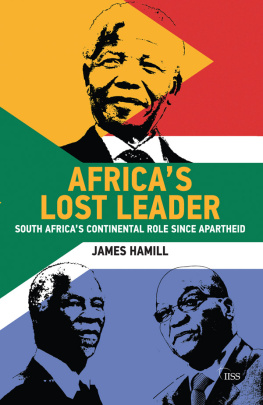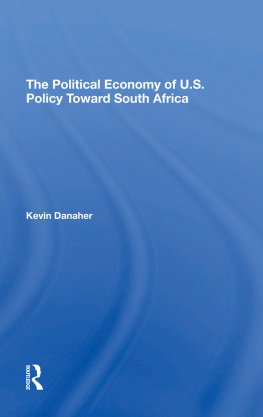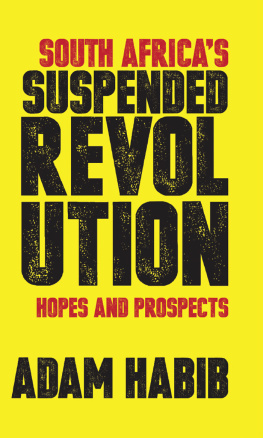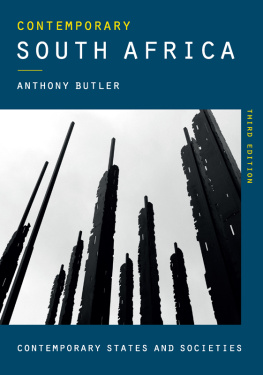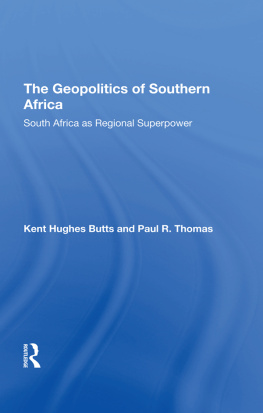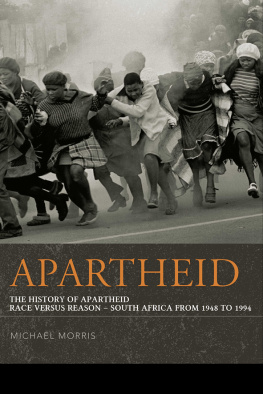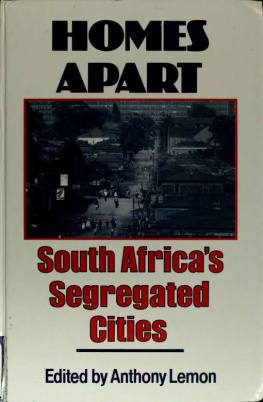South Africa into the 1980s
Other Titles in This Series
Apartheid and International Organizations, Richard E. Bissell
Ethnicity in Modern Africa , edited by Brian M. du Toit
Botswana: An African Growth Economy, Penelope HartlandThunberg
Zambia's Foreign Policy: Studies in Diplomacy and Dependence, Douglas G. Anglin and Timothy Shaw
Crisis in Zimbabwe , edited by Boniface Obichere
Westview Special Studies on Africa
South Africa into the 1980s
edited by Richard E. Bissell and Chester A. Crocker
The question of South Africa's future has become a paramount issue in global politics. This book examines the position of South Africa as it faces the 1980sits strengths, its weaknesses, and the probable influences of other states on South Africa in the years to come.
The authors share a common interest in an analytical approach to a topic often argued with more emotion than rationality. They discuss South Africa's internal situation, with particular emphasis on the interests and aspirations of the political parties competing for power; then they focus on external realities, looking at the country's ability to project influence abroad as well as the power of others to affect events within it. In sum, they highlight crucial trends shaping South Africa's current and future development.
Richard E. Bissell is managing editor of ORBIS and research associate at the Foreign Policy Research Institute.
Chester A. Crocker is director of African studies at Georgetown University's Center for Strategic and International Studies and associate professor of international relations at the university's School of Foreign Service.
South Africa into the 1980s
edited by Richard E. Bissell and Chester A. Crocker
First published 1979 by Westview Press, Inc.
Published 2019 by Routledge
52 Vanderbilt Avenue, New York, NY 10017
2 Park Square, Milton Park, Abingdon, Oxon OX14 4RN
Routledge is an imprint of the Taylor & Francis Group, an informa business
Copyright 1979 Taylor & Francis
All rights reserved. No part of this book may be reprinted or reproduced or utilised in any form or by any electronic, mechanical, or other means, now known or hereafter invented, including photocopying and recording, or in any information storage or retrieval system, without permission in writing from the publishers.
Notice:
Product or corporate names may be trademarks or registered trademarks, and are used only for identification and explanation without intent to infringe.
Library of Congress Cataloging in Publication Data
Main entry under title:
South Africa into the 1980s.
(Westview special studies on Africa)
Bibliography: p.
Includes index.
1. South AfricaPolitics and government1961- 2. South AfricaRace rela
tions. 3. South AfricaForeign relations. 4. Africa, SouthernPolitics and govern
ment1975- I. Bissell, Richard E. II. Crocker, Chester A.
DT779.9.S674 320.9'68'06 79-14152
ISBN 13: 978-0-367-28793-1 (hbk)
For Suzanne and For Sane
Contents
, John Seller
, Steven F. McDonald
, Roy Godson
, Chester A. Crocker
, I. William Zartman
, W. Scott Thompson and Brett Silvers
, Bruce J. Oudes
, Lawrence G. Franko
, Richard E. Bissell
, Richard E. Bissell and Chester A. Crocker
The explosion of news coverage with South African datelines since the April 1974 Portuguese coup d'etat has strained the absorptive capacity of informed Americans. Lacking a historical basis of familiarity with the region or a generally accepted understanding of U.S. interest there, our society is in the midst of an almost breathless "catch-up" operation concerning southern Africa, and Africa more generally. News of discrete events in this most troubled of regions is interpreted by and for persons who have only the most limited context against which to judge them. As a result, it seems likely that another great debate lies ahead over the nature of the conflicts in southern Africa, the issues at stake for the United States, and the alternatives available to policymakers and citizens. The Republic of South Africa is the centerpiece of this debate. To date, there is disturbing evidence that it may be shaped in substantial measure by ignorance of that country's complexities and by the polarized emotions that South Africa so readily generates. Given the absence of consensus on basic foreign policy premises in the United States, the South Africa debate in the 1980s could develop into a major testing ground of American purposes more broadly.
The purpose of this book is to explore critical trends, patterns, and underlying relationships that are sufficiently durable to provide a basis for considering South Africa's development as we enter the 1980s. The volume is not intended to be a definitive or comprehensive contemporary analysis of the South African system. Its scope is far from encyclopedic in that the emphasis lies on the political dimension of South African development. At the same time, it ranges well beyond the primarily domestic focus of a one-country study to address the complex external environment in which the republic's white and black elites will have to function. In planning the volume, the editors envisaged a need for analytic thinking about the realities of power, influence, bargaining, and conflict that appear most likely to shape the actual course of events in and around South Africa in the coming period. Accordingly, the contributors were not selected in order to achieve homogeneity of ideological orientation, nor were they asked to draw conclusions for policymakers in their chapters.
South Africa into the 1980s seeks to move away from current headlines in order to establish some elements of the bigger picture. Long-time observers of African affairs are only too well aware of the pitfalls of casual or speculative prediction. Moreover, the methodological and conceptual obstacles to rigorous forecasting in this arena are awesome to contemplate. With hindsight, one can point to a number of foolhardy assessments of South Africa's imminent violent transformation in the wake of the Sharpeville tragedy, in which some seventy-two unarmed Africans were killed by police gunfire nearly two decades ago. Today, voices are again being raised suggesting that the white-dominated system will collapse within a few years under the onslaught of African nationalist pressures. Set against these prophecies of apocalypse is the conventional wisdom of the late 1960s and early 1970s that so readily dismissed the prospects of revolutionary change in the former Portuguese territories and Rhodesia just a few short years before such change came to a head. Other assessmentsabout the capacity of Afrikanerdom to redirect or crush the majoritarian ("one man-one vote") ideal or, alternatively, about the inherent illegitimacy of black leadership in the government-sponsored Bantu homelands (Bantustans)stand as testimony to the risks of prediction.
The essays in this book provide background material, analysis of contemporary factors deemed most salient for each topic, and a modest forward projection. Our intent is to shed light on factors influencing the policies and perceptions of various actors as South Africa enters the 1980s. We make no pretenseand it would surely have to be pretenseof offering a prediction of South African developments ten years hence. In the case of several chapters, the author's task was to evaluate alternative sets of conclusions about recent events and to derive implications for the years immediately ahead.




